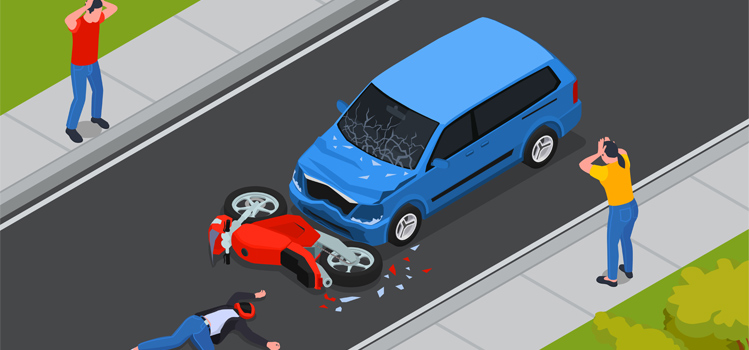Hit and Run: Legal Implications Under the Motor Vehicles Act 1988 (MVA) and Indian Penal Code 1860 (IPC)
Posted On : October 11, 2023

Table of Contents
Introduction
The Motor Vehicles Act, 1988 (MVA), and the Indian Penal Code, 1860 (IPC) are two crucial legislations that govern various aspects of road safety, traffic regulations, and criminal offenses related to motor vehicles in India. These laws play a pivotal role in ensuring the orderly functioning of the country's transportation system and safeguarding the rights and safety of individuals. In this article, we will explore the legal implications of the MVA and IPC and their significance in maintaining law and order on Indian roads.
The Motor Vehicles Act, 1988 (MVA)
The Motor Vehicles Act, 1988, is the primary legislation governing all aspects of motor vehicles in India. It covers issues ranging from vehicle registration, licensing of drivers, road safety, insurance, and penalties for violations. Some of the key legal implications under the MVA include:
-
Licensing of Drivers
The MVA lays down the rules and procedures for obtaining a driving license in India. It defines various categories of licenses and sets the criteria for eligibility. Driving without a valid license is a punishable offense under this act. -
Vehicle Registration
All motor vehicles used in public places must be registered as per the provisions of the MVA. The act outlines the process for vehicle registration, transfer of ownership, and the issuance of registration certificates. -
Road Safety
The MVA contains numerous provisions related to road safety. It prescribes speed limits, rules for overtaking, and regulations for the use of helmets and seat belts. Violations of these rules can result in fines and penalties. -
Insurance Requirements
Under the MVA, every motor vehicle must have a valid insurance policy that covers third-party liabilities. Failure to maintain insurance can lead to legal consequences in case of accidents. -
Traffic Rules and Regulations
The act specifies various traffic rules, including rules for parking, overtaking, and signaling. It also covers matters like giving way to emergency vehicles and regulating the movement of goods vehicles. -
Penalties and Fines
The MVA prescribes penalties and fines for various offenses, including traffic violations, overloading of vehicles, and using vehicles without proper permits. The fines can vary depending on the nature and severity of the offense. -
Drunk Driving
Driving under the influence of alcohol or drugs is a grave offense under the MVA. It mandates strict penalties, including fines, suspension of driving licenses, and imprisonment for repeat offenders. -
Accident Compensation
The MVA establishes provisions for compensating victims of road accidents. It sets up Motor Accident Claims Tribunals to adjudicate claims for compensation from insurance companies or the party at fault. -
Vehicle Emissions
The MVA includes provisions related to vehicle emissions and pollution control measures. It empowers authorities to regulate emissions and enforce standards to reduce environmental pollution. -
Special Provisions
The MVA also contains special provisions related to the regulation of commercial vehicles, public transport, and the functioning of regional transport authorities.
In addition to the primary provisions mentioned above, the MVA has been subject to several amendments and updates over the years to address emerging issues and enhance road safety. These amendments have introduced provisions related to electric vehicles, vehicle recalls, and the use of technology for traffic management, among others.
The Indian Penal Code, 1860 (IPC)
The Indian Penal Code, 1860, is the primary criminal code of India, covering a wide range of offenses. In the context of motor vehicles, several provisions of the IPC come into play. Under the Indian Penal Code, 1860 (IPC), hit and run is covered under various sections depending on the specific circumstances of the incident. Here are the relevant sections of the IPC that pertain to hit and run cases:
Section 279 - Rash Driving or Riding on a Public Way
- This section deals with cases where a person drives or rides recklessly or negligently on a public road, thereby endangering human life or safety.
- If such reckless or negligent driving results in an accident and the driver flees the scene without providing necessary information, they can be charged under this section.
- The punishment for a violation of Section 279 includes imprisonment for up to six months or a fine of 1000 INR, or both.
Section 304A - Causing Death by Negligence
- If a person's rash or negligent driving causes the death of another person, even if it was not their intention to cause harm, they can be charged under this section.
- Hit and run cases involving fatalities often result in charges under Section 304A.
- The punishment for a violation of Section 304A is imprisonment for up to two years or a fine, or both.
Section 337 - Causing Hurt by Act Endangering Life or Personal Safety of Others
- If an accident caused by reckless or negligent driving results in injuries to others, the driver can be charged under Section 337.
- The punishment for a violation of Section 337 includes imprisonment for up to six months, or a fine which may extend to 500 INR, or both.
Section 338 - Causing Grievous Hurt by Act Endangering Life or Personal Safety of Others
- In cases where the injuries caused by the accident are severe, the driver can be charged under Section 338.
- The punishment for a violation of Section 338 includes imprisonment for up to two years, or a fine which may extend to 1000 INR, or both.
Section 427 - Mischief Causing Damage to Property
- If the hit and run incident results in damage to public or private property, the driver can be charged under Section 427.
- The punishment for a violation of Section 427 includes imprisonment for up to two years, or a fine, or both.
Conclusion
The Motor Vehicles Act, 1988, and the Indian Penal Code, 1860, are essential legal frameworks that regulate motor vehicle operations and deal with criminal offenses related to road safety in India. These laws aim to promote responsible and safe driving, protect the rights of victims, and maintain order on the roads. It is imperative for all citizens to be aware of these legal implications and abide by the rules and regulations to ensure the safety and well-being of themselves and others while using motor vehicles on Indian roads. For more information related to motor vehicles act and road accident issues, it is advisable to consult a Motor Accident Lawyer or lawyer in your area. For example, if you are a resident of Kolkata you need to consult a Motor accident lawyer or lawyer in Kolkata.





















